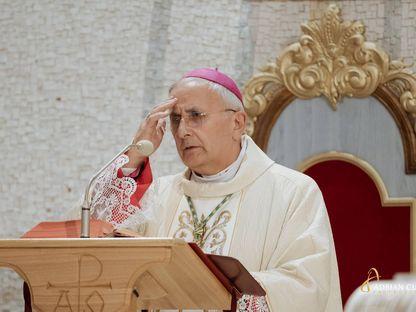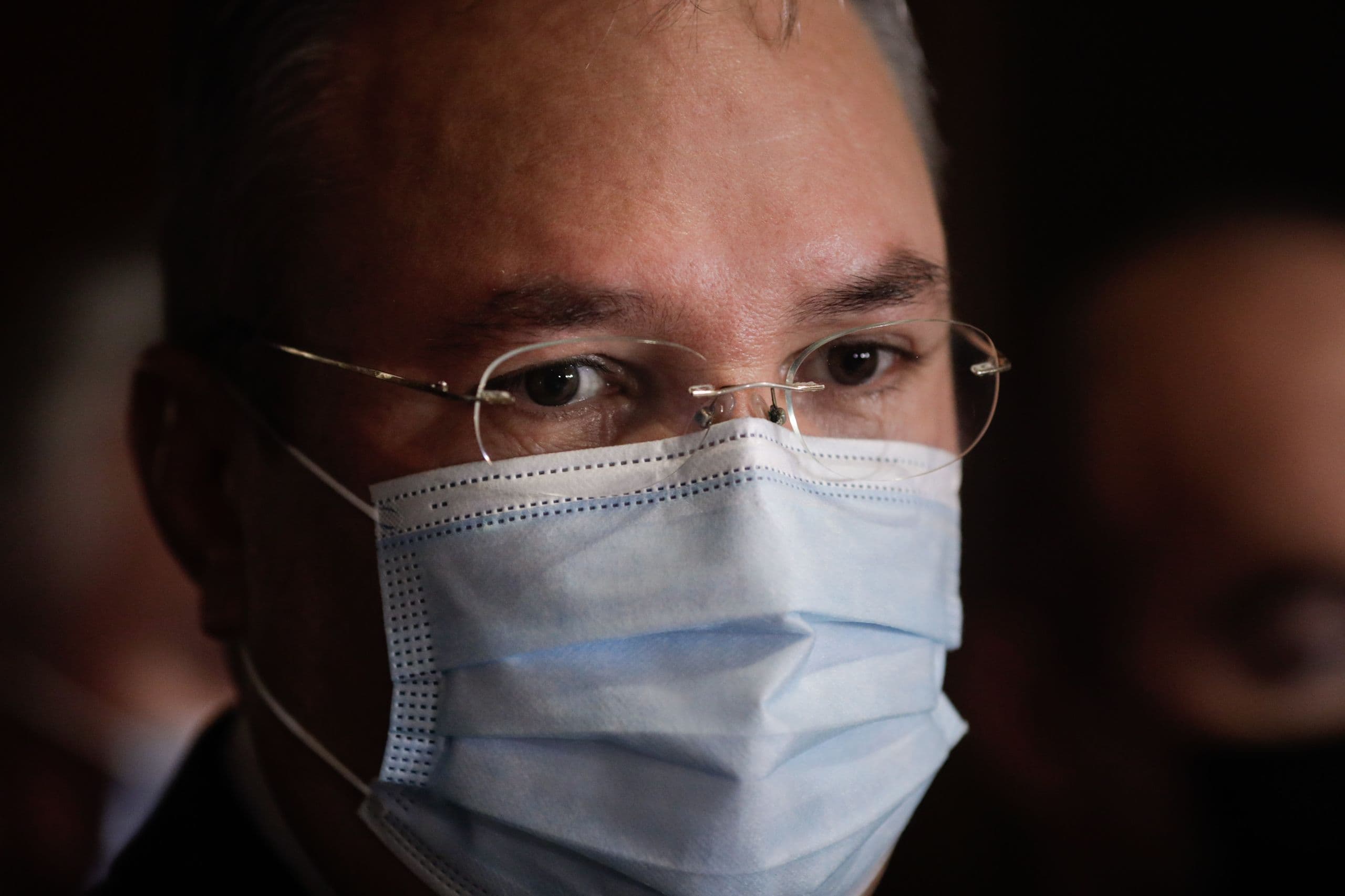
Nicolae Ciucă on November 21, 2021, a few days before being sworn in as prime minister. PHOTO: George Călin / INQUAM PHOTOS
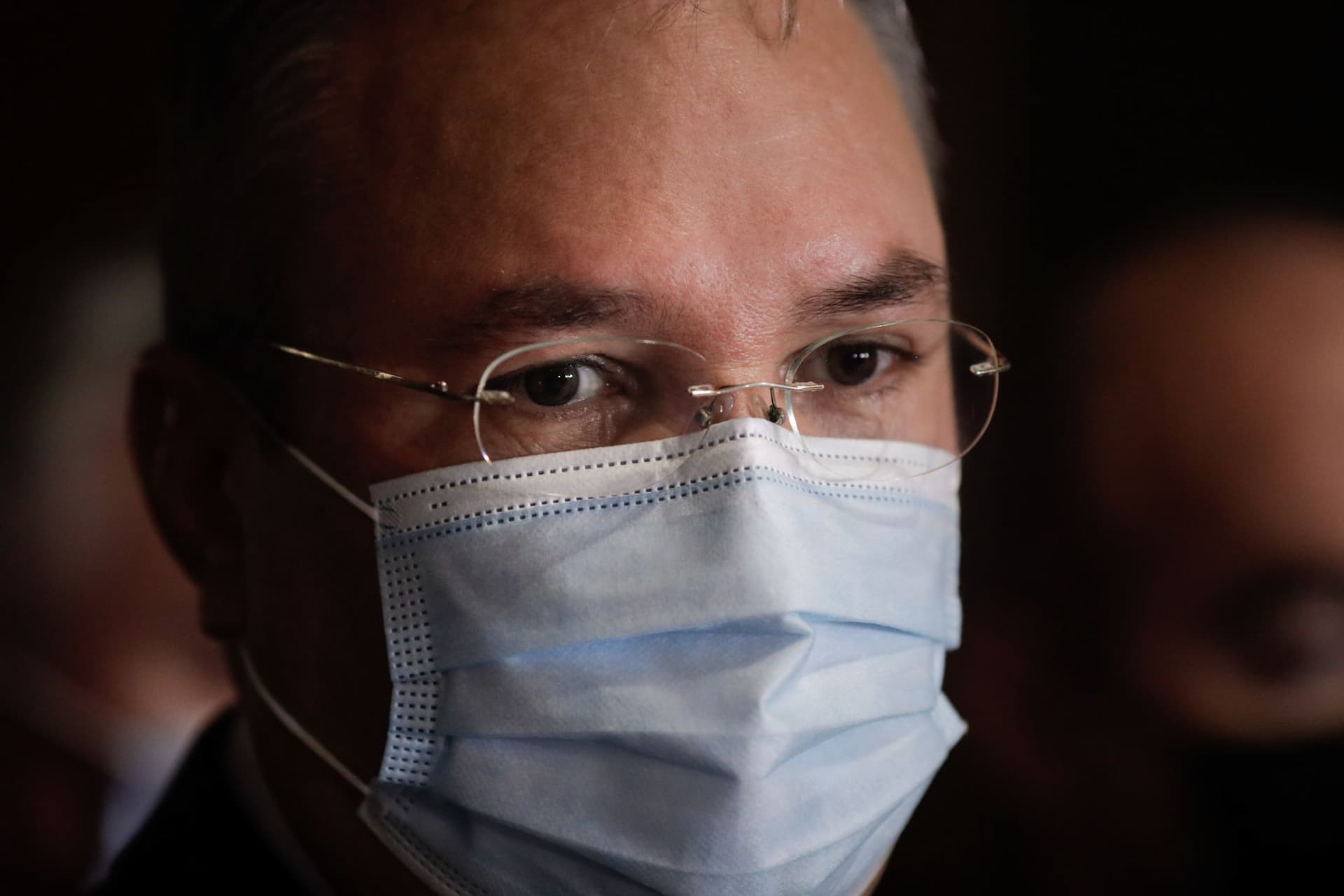
Nicolae Ciucă on November 21, 2021, a few days before being sworn in as prime minister. PHOTO: George Călin / INQUAM PHOTOS
Prime Minister Nicolae Ciucă Plagiarized His PhD Thesis. Among the Sources He Copied from - Two Other Doctorates
English Section
20/07/2022
- Nicolae Ciucă's 2003 thesis, which earned him a PhD in Military Sciences, includes at least 42 pages with plagiarized content, out of a total of 138.
- The content of at least 19 pages was plagiarized from two other doctoral theses previously defended at the National Defense University "Carol I" (UNAP). One of them had been coordinated by the prime minister's supervisor.
- With a few exceptions, the sections identified as plagiarized had been copied from printed sources, which anti-plagiarism software could not detect.
- I was granted access to the thesis in December 2021, after three written requests made by PressOne to Romania’s National Library starting with May 2020. In early January, one week before the publication of this article, I also received access to the UNAP Library.
- I will not be able to present photocopies of the pages in this article, because the regulations of both the National Library and UNAP prohibit photographing pages from a doctoral thesis. Instead, you will be able to read the transcripts of some pages from the prime minister's work and from the source-texts, side by side.
- Aside from the word-for-word copying, the analysis of the paper revealed four classic plagiarism concealment techniques used in the prime minister's thesis.
- In a statement issued on January 17 at my request for comment, prime minister Nicolae Ciucă claims that his doctoral thesis "was drafted in accordance with the legal requirements in effect at that time." The prime minister's full point of view has been included in the article below.
Romanian prime minister and reserve general Nicolae Ciucă plagiarized the doctoral thesis he defended in 2003 at the "Carol I" National Defense University (UNAP).
Several pages of his work were copied without correct attribution to the original authors of the source-texts and without quotation marks, as required by the academic rules in effect at the time.
I analyzed the 138 pages of the thesis, based on the limited bibliographic resources available in print format at the National Library of Romania and the UNAP library.
Beyond the copied content already revealed, it’s not out of the question that an analysis of extensive bibliographic sources might reveal more plagiarized content. These extended sources might include internal documents of the departments of Euro-Atlantic Integration and International Military Relations within the Ministry of National Defense, mentioned in the thesis.
Proven plagiarism aside, prime minister Nicolae Ciucă’s doctoral thesis bears no academic relevance. It does not include any research methodology, nor research, two mandatory elements of any doctoral thesis.
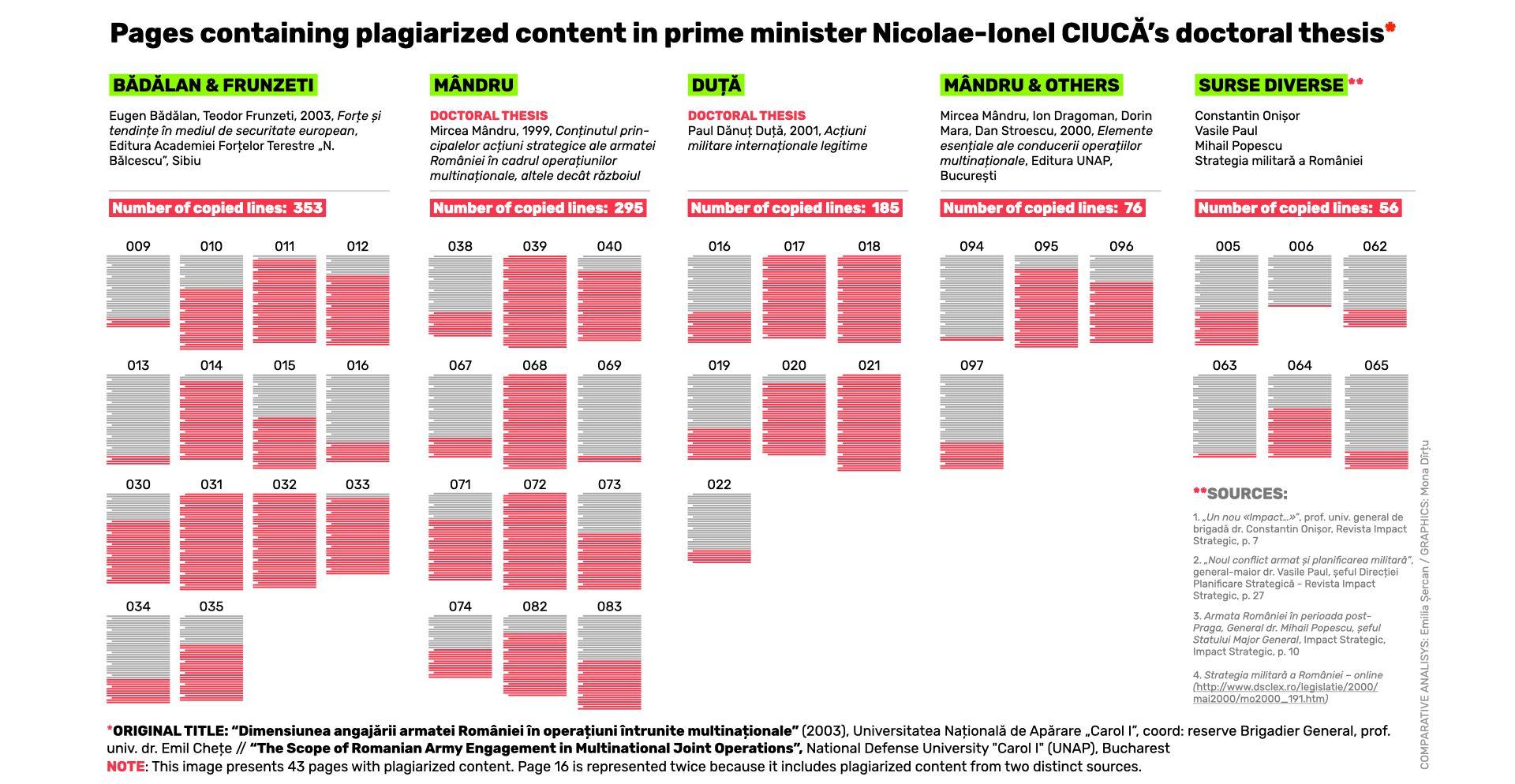
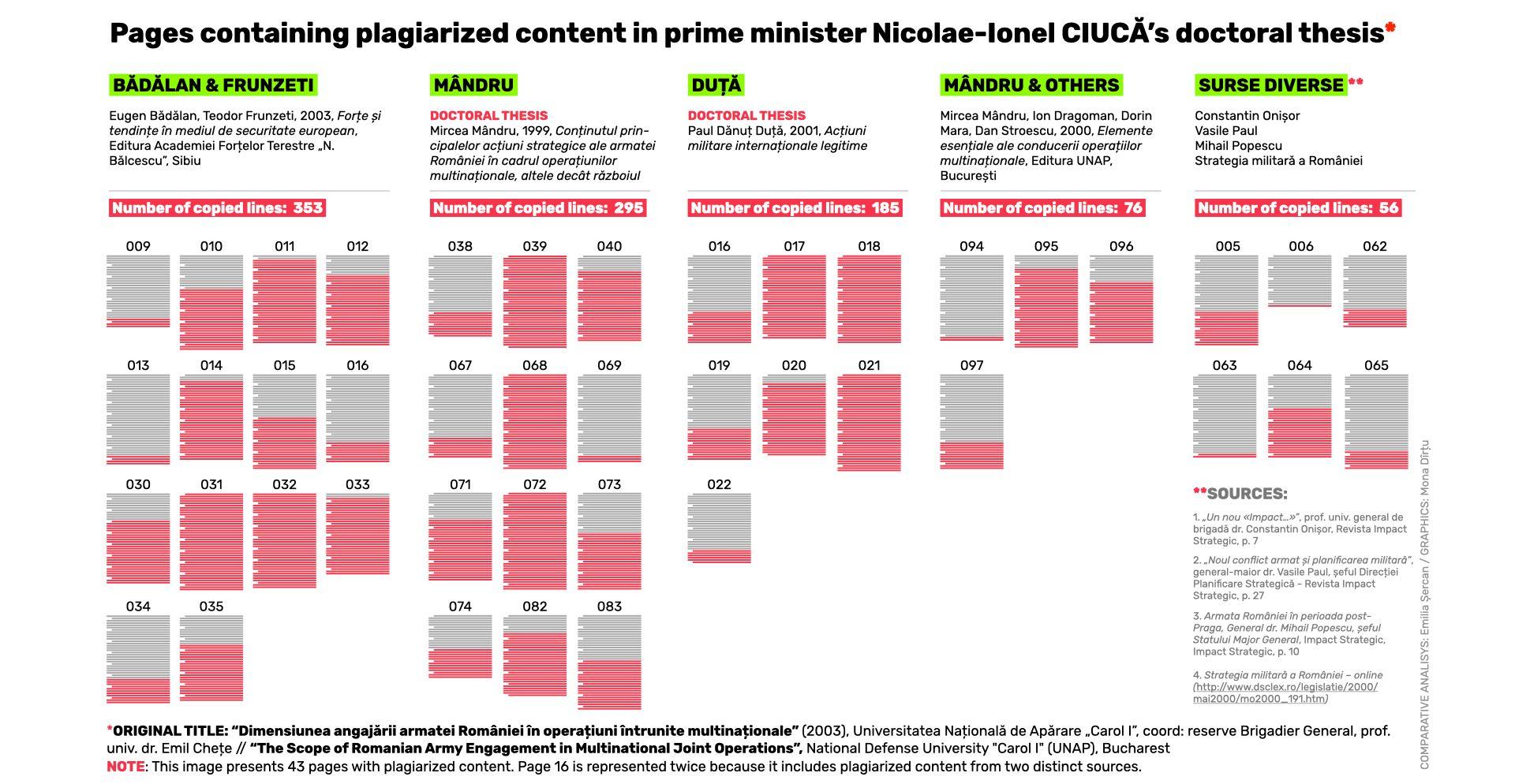
***
The main plagiarized content sources in prime minister Nicolae Ciucă’s thesis are two doctoral theses, which were later published as books, as well as two other books.
Mulți ne citesc, puțini ne susțin. Fără ajutorul tău, nu putem continua să scriem astfel de articole. Cu doar 5 euro pe lună ne poți ajuta mai mult decât crezi și poți face diferența chiar acum!
The first PhD thesis identified as a source of plagiarized content in Ciucă's work was written by Paul Dănuț Duță and defended at UNAP in 2001. The title of the scientific work is Legitimate International Military Actions and it was coordinated by Professor Emil Chețe, who was also the prime minister’s PhD supervisor.
Paul Dănuț Duță published a part of his thesis in 2001, at the Military Publishing House in Bucharest, in a collective work titled The Legitimacy of Military Operations - Other Than War. The book’s authors are Iosif Armaș, Cornel Purcărea, and Paul Dănuț Duță.
Armaș was a social-democrat deputy in the 2000-2004 legislature and was regarded at the time as one of the party "barons". Purcărea is a former military intelligence officer, according to Rise Project.
The second PhD thesis was penned by Mircea Mândru and was also defended at UNAP in 1999. His work, titled The Content of the Main Strategic Actions Undertaken by the Romanian Army in Multinational Operations Other than War, was coordinated by Professor Valentin Arsenie.
This thesis was also published in book form, under the title The World Between the Cold War and the Hot Peace. It came out in 2000, under Mândru's name, at the Expert Publishing House in Bucharest.
Predator in Robes: The Diocese of Iași and the Vatican Buried a Sexual Assault Committed by a Catholic Priest Against a Minor in Bacău, Failing to Alert Prosecutors
A Roman Catholic priest abused a 13-year-old girl in the parish where he served in Bacău County: the bishop of Iași knew about it, sent the case to the Vatican, and applied canonical sanctions, but did not notify the authorities, who only intervened later and sentenced him to prison.
The plagiarism of another doctoral thesis is a particularly serious act of violating academic integrity.
By definition, a doctoral thesis is the result of original scientific research, whose purpose, through the discoveries made, is to contribute to the corpus of collectively shared knowledge and the progress of humanity. Appropriating the results of someone else's work defeats the very purpose of doctoral studies.
This particular case is of even greater significance, as both theses plagiarized by Nicolae Ciucă had been defended a few years earlier, within the same doctoral school. One of them was even coordinated by the current prime minister's supervisor, reserve Brigadier General Emil Chețe.
Un newsletter pentru cititori curioși și inteligenți.
Sunt curios
This is not the first time that a UNAP PhD student plagiarizes the thesis of a fellow UNAP doctoral student.
Another thesis in which I discovered a similar situation, also defended at UNAP, is that of former Interior Minister Petre Tobă, about whom I reported exclusively for PressOne in November 2015.
Back to the prime minister's thesis: aside from the two PhDs, he also lifted content from two books.
The first book in which I identified plagiarized content was published a few months before Ciucă defended his thesis. Its authors are reserve General Eugen Bădălan, former General Army Staff Chief, and reserve General Teodor Frunzeti, former UNAP Rector and former Adviser to the Presidential Administration during the first term of President Klaus Iohannis.
The second book is signed by a team of four authors, all of them from military ranks: Mircea Mândru, Ion Dragoman, Dorin Mara, Dan Stroescu.
***
Neither the two PhD theses, nor their published versions, nor the two books from which prime minister Ciucă copied are available in digital format. In other words, checking them with software designed to identify similarities would fail to reveal evidence attesting to the plagiarism.
Education Minister Sorin Cîmpeanu, the most vocal promoter of using anti-plagiarism software in order to "solve" the plagiarism crisis that plagues Romanian universities, demanded in September 2021 that universities check all the PhD theses defended after 1990. Such a check, spanning almost three decades, can only be completed by using such digital tools.
The software, although useful as a prevention tool before the theses are defended, has two major drawbacks when used to detect plagiarism in a work that’s already been completed:
- It can only check digitized sources that are available online;
- It cannot detect plagiarism per se: it just notes similarities between works, which can sometimes be legitimate, but it cannot identify the plagiarism of ideas and structure.
A few months prior to September 2021, when he asked universities to check all doctoral theses defended between 1996 and 2016, Minister Cîmpeanu tried to impose the software as a procedure in the methodology used by the National Council for the Attestation of University Degrees, Diplomas, and Certificates (CNATDCU) to analyze claims of plagiarism.
The minister's plan was to mandate CNATDCU to analyze „in integrum” all theses under suspicion--an operation that could have only been completed by using the software. Once a non-plagiarism verdict came through, according to Cîmpeanu's intent, any subsequent complaint would have to be rejected, regardless of any newly discovered evidence.
94.2% of the plagiarized content discovered in prime minister Nicolae Ciucă’s thesis comes from undigitalized works, undetectable by the software.
Throughout the past decade, history has recorded numerous cases of plagiarism from undigitalized sources. Former prime minister Victor Ponta, former Deputy prime minister Gabriel Oprea, former Finance Minister Darius Vâlcov, and former Health Minister Florian Bodog were all declared plagiarists by CNATDCU, based on evidence that only existed in print.
Disclaimer: On why you can’t see photos of the plagiarism evidence today
I consulted the doctoral thesis of prime minister Nicolae Ciucă in two separate libraries. At the National Library I had access to the paper in electronic format, on a computer, and at the UNAP library in printed format.
Beginning with 2016, one can only consult doctoral theses at the National Library in digital format.
Digitizing a work can take months. The maximum scan time for a single thesis, in my experience, was ten months.
At both libraries I had to sign a document acknowledging that photographing pages from the thesis was prohibited, a measure explained through copyright protection. Had I taken photos, I would have risked having my access permit to the two libraries suspended.
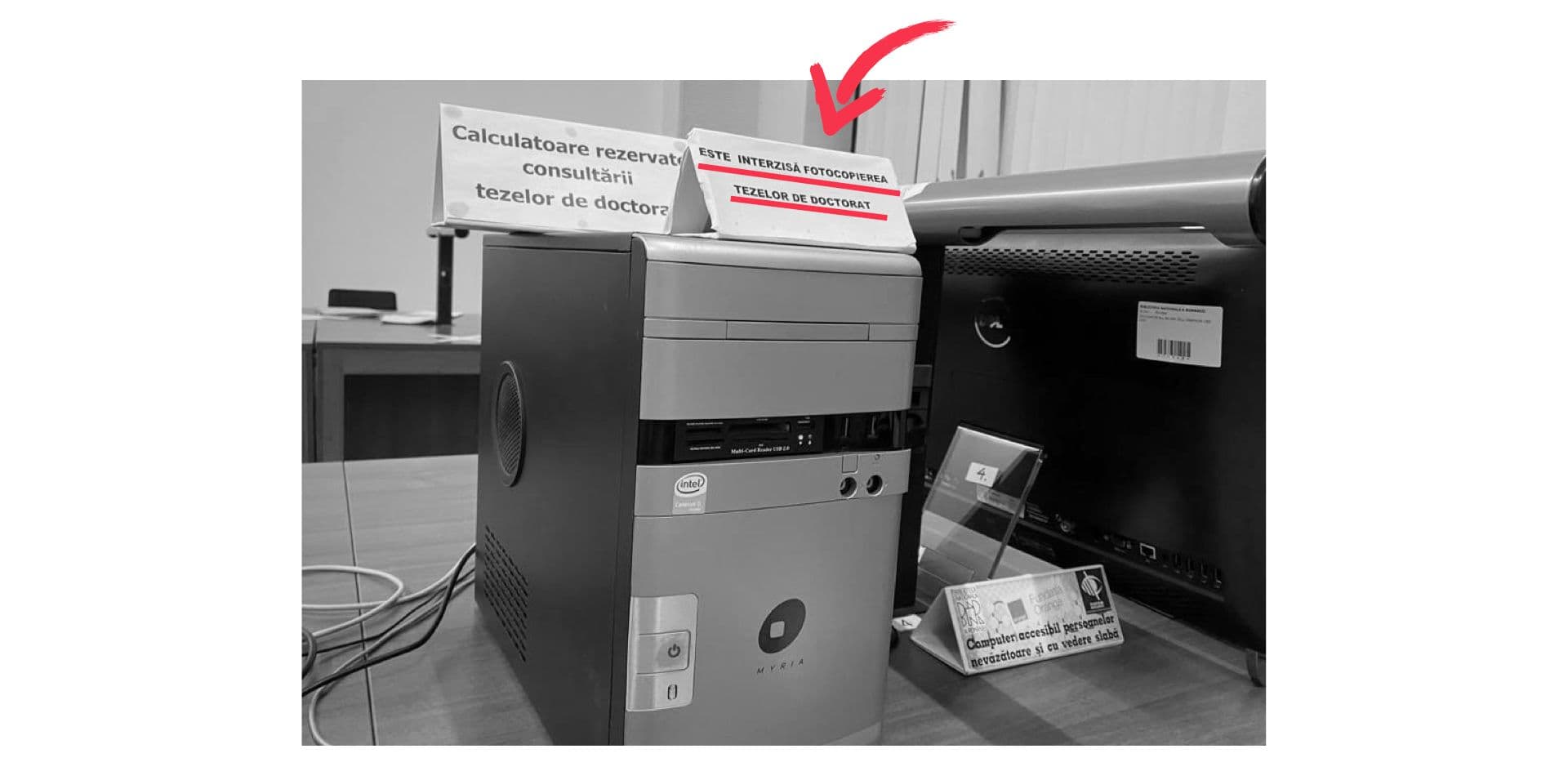
Computers reserved for consulting PhD theses at the National Library. The sign reads: “Photographing the PhD theses is prohibited”.
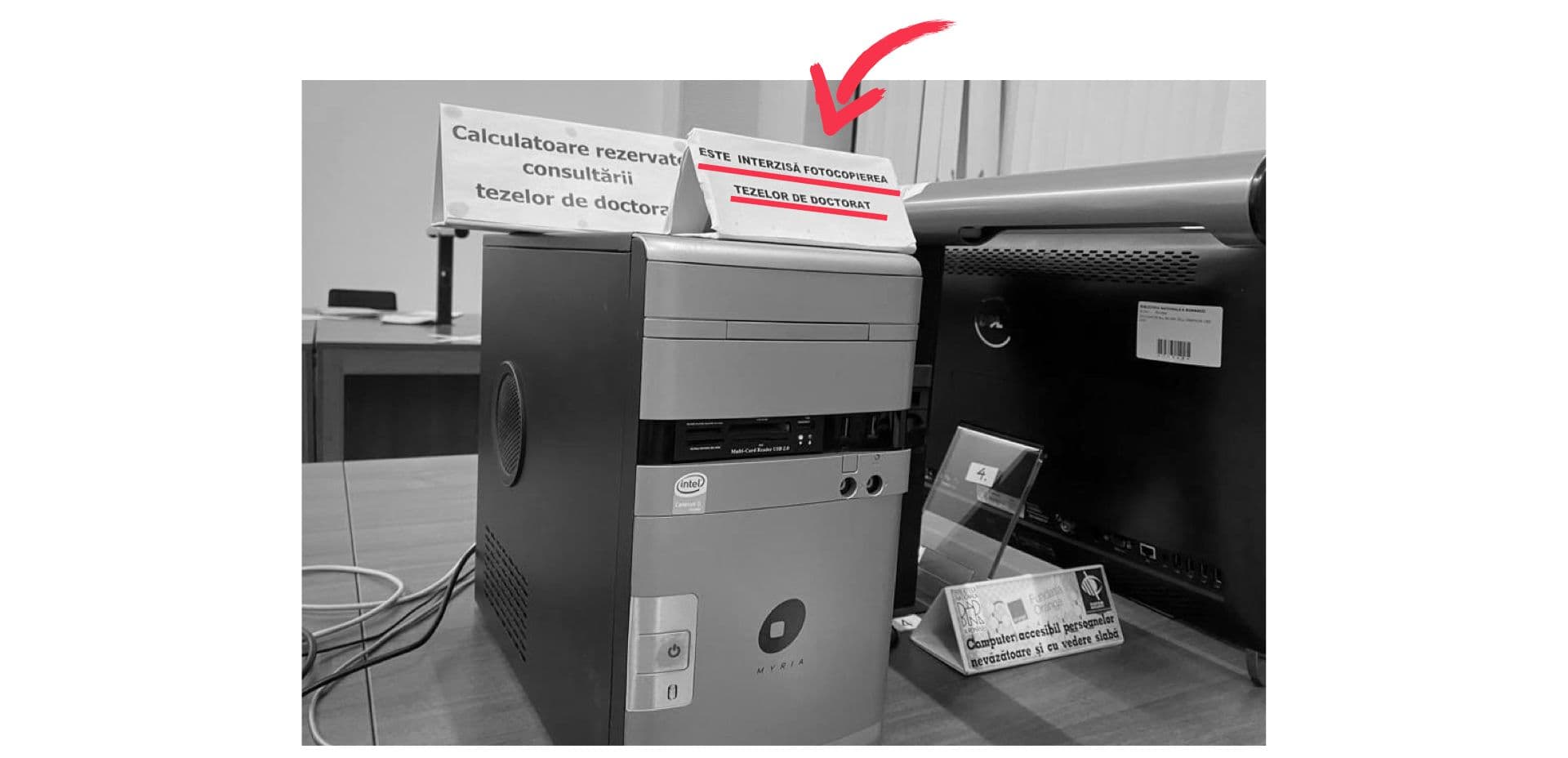
Computers reserved for consulting PhD theses at the National Library. The sign reads: “Photographing the PhD theses is prohibited”.
For this very simple reason, in this article you will not be able to see pages from prime minister Nicolae Ciucă’s doctoral thesis placed side by side, for comparison, with those from the plagiarized works.
As a solution, I transcribed a few pages, which I rendered exactly, in terms of content, as well page layout.
***
Nicolae Ciucă enrolled at the doctoral school in 1999, and four years later obtained a doctorate in Military Sciences at the National Defense University "Carol I" (UNAP).
The title of his paper is The Scope of Romanian Army Engagement in Multinational Joint Operations.
On July 31, 2003, the day he publicly defended his doctoral thesis, Nicolae Ciucă was a lieutenant colonel at Military Unit (UM) 01047 Craiova.
According to his resume, in 1998, one year prior to enrolling at the doctoral school, lt. col. Ciucă became chief of staff of the 26th "Neagoe Basarab" Infantry Battalion in Craiova.
His doctoral studies overlap with at least two missions that Nicolae Ciucă carried out abroad, as mentioned in his resume: the multinational Dynamic Response exercise, which took place between April and May 2001, in Bosnia and Herzegovina, and the Enduring Freedom mission, which took place between June 2002 and January 2003, in Afghanistan.
In 2006, three years after obtaining his PhD in Romania, Nicolae Ciucă attended a master's program in Strategic Studies at the Army War College in the United States of America.
At the end of last year, former ambassador Cătălin Avramescu, an associate professor at the Faculty of Political Sciences within the University of Bucharest, wondered in a Facebook post how it was possible for Nicolae Ciucă to obtain a master's degree in the USA after getting a PhD in Romania, in the same field of Military Sciences.
On the scale of higher learning, a PhD ranks higher than a master's degree, which makes it utterly unusual for someone who obtained the title of Doctor of Military Science to only want to get a master's degree afterwards--but in the same field.
I. NICOLAE CIUCĂ’S PLAGIARISM
Prime minister Nicolae Ciucă’s doctoral thesis clocks in at a total of 309 pages. The thesis itself is 147 pages long, including the title, table of contents and works cited pages, and another 162 pages are appendices.
If we remove the paper’s title page and its table of contents, the content itself covers 138 pages. The introduction to the paper is two pages long, Chapter I has 54 pages, Chapter II - 44 pages, Chapter III - 35 pages, and the Conclusions and proposals - three pages. The Bibliography is five pages long.
I analyzed Nicolae Ciucă's doctoral thesis both at the National Library and the UNAP library.
PressOne first filed a request with the National Library for access to the prime minister's PhD thesis in September 2020. A second request was submitted in May 2021, and a third one in October. The thesis was only digitized and became accessible to the public on December 16, 2021.
A constraint to my analysis was the fact that I could not find all the materials I suspected could be sources of plagiarism--neither at the National Library, nor at that of the UNAP.
***
I discovered the first indications of plagiarism in the very Introduction to Nicolae Ciucă's doctoral thesis.
In order to determine the plagiarized content with maximum accuracy, I counted the lines copied in each page of the thesis and indicated the number in several tables, which can be found below.
In the Introduction, the prime minister copies, without citation, entire paragraphs from three articles published in a 2003 issue of the Impact Strategic magazine, which had been published a few months before he defended his thesis. The Impact Strategic magazine is published by the Center for Strategic Security Studies, under the Ministry of National Defense.


Other paragraphs identified as plagiarized from online sources are lifted from Romania's 2000 Military Strategy.
Normally, texts from regulatory documents can be cited in an academic paper, if the author’s purpose is to provide comment, analysis, critique, or explanations.
In the prime minister's thesis, the content taken from the National Military Strategy is presented without quotation marks, leaving the impression it represents the doctoral student's original contribution.
***
In the beginning of the thesis, Lt. Col. Nicolae Ciucă bows to the then-supreme commander of the Army, President Ion Iliescu.
He is quoted in the first footnote to Chapter I - the second footnote in the entire thesis. "Excerpt from the President's statement made at Cotroceni Palace, November 23, 2002" is a reference that PhD student Ciucă considered relevant for his topic of The Scope of Romanian Army Engagement in Multinational Joint Operations.
In the quoted speech, President Iliescu says that „Romania's admission to NATO is both a recognition of how the Romanian people strive towards democratic reforms, as well as of its role as a stabilizing factor in this part of Central Europe […]. We have only traveled a part of the road that leads us to becoming fully connected to the European and Euro-Atlantic institutions.”
The then-prime minister of the country, Adrian Năstase, is also referenced in the current prime minister’s doctoral thesis. Năstase is cited with the work Public International Law, published in 1995, and co-authored by Alexandru Bolintineanu. The publishing house of this work is not mentioned, neither in the footnotes, nor in the Bibliography.
In reality, the content in which he refers to former prime minister Năstase - including the footnotes in which Năstase is mentioned - is plagiarized from the work of Paul Dănuț Duță.
***
In the 14 pages of Chapter I of the thesis there are plagiarized sections from a book published by the Publishing House of the „N. Bălcescu” Academy of Land Forces from Sibiu, shortly before Ciucă’s thesis was publicly defended.
Without using any means of citation, Nicolae Ciucă lifts entire pages from the book Forces and Trends in the European Security Environment, authored by Eugen Bădălan - one of Ciucă's predecessors at the head of the General Army Staff - and by Teodor Frunzeti, former defense adviser at the Presidential Administration during President Iohannis’ first term.
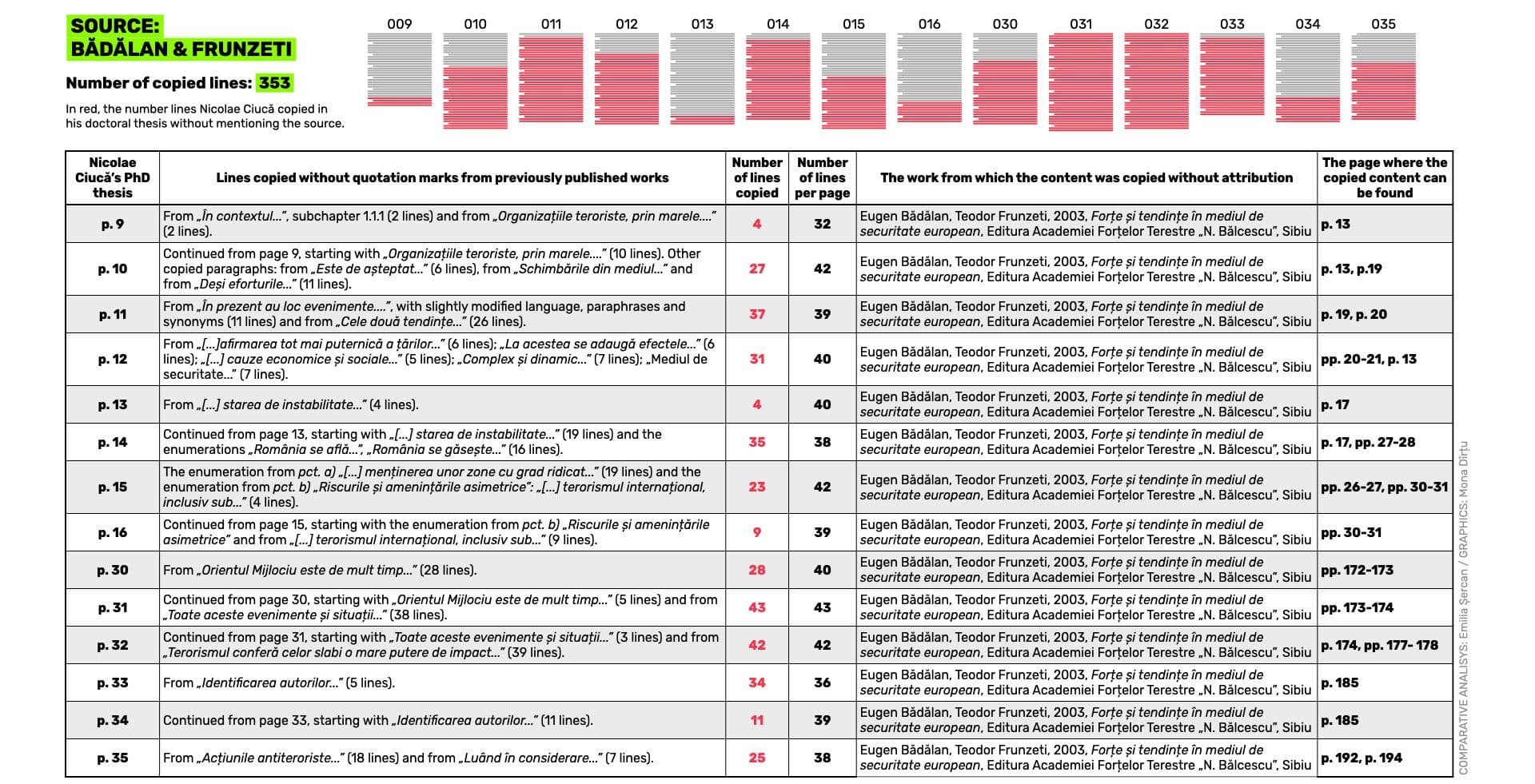
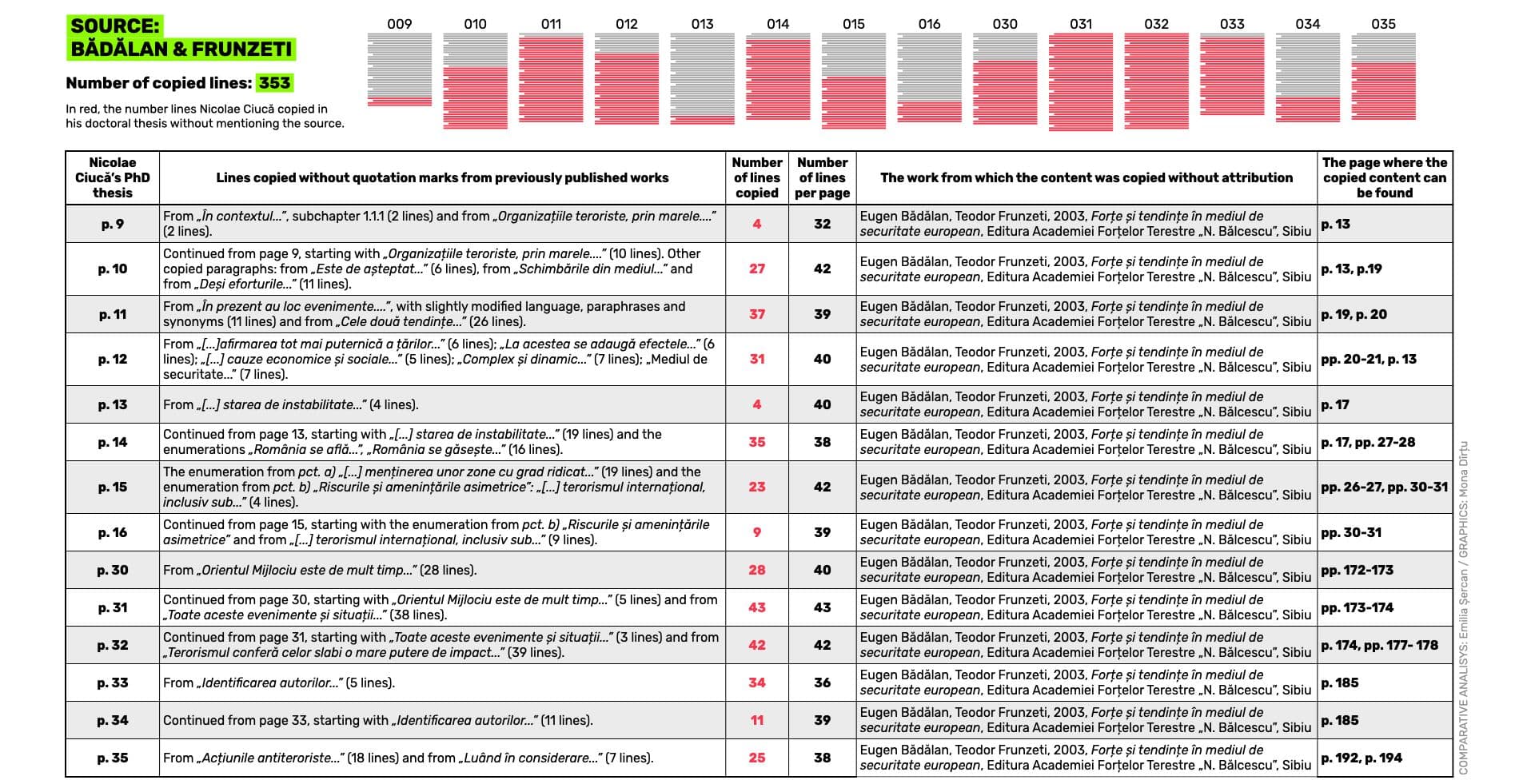
On the National Library computer, I transcribed page 11 of the prime minister's thesis and rendered it exactly, including the footnotes, in the image below. Next to it, marked in red, are the paragraphs copied by Ciucă from the source-text.
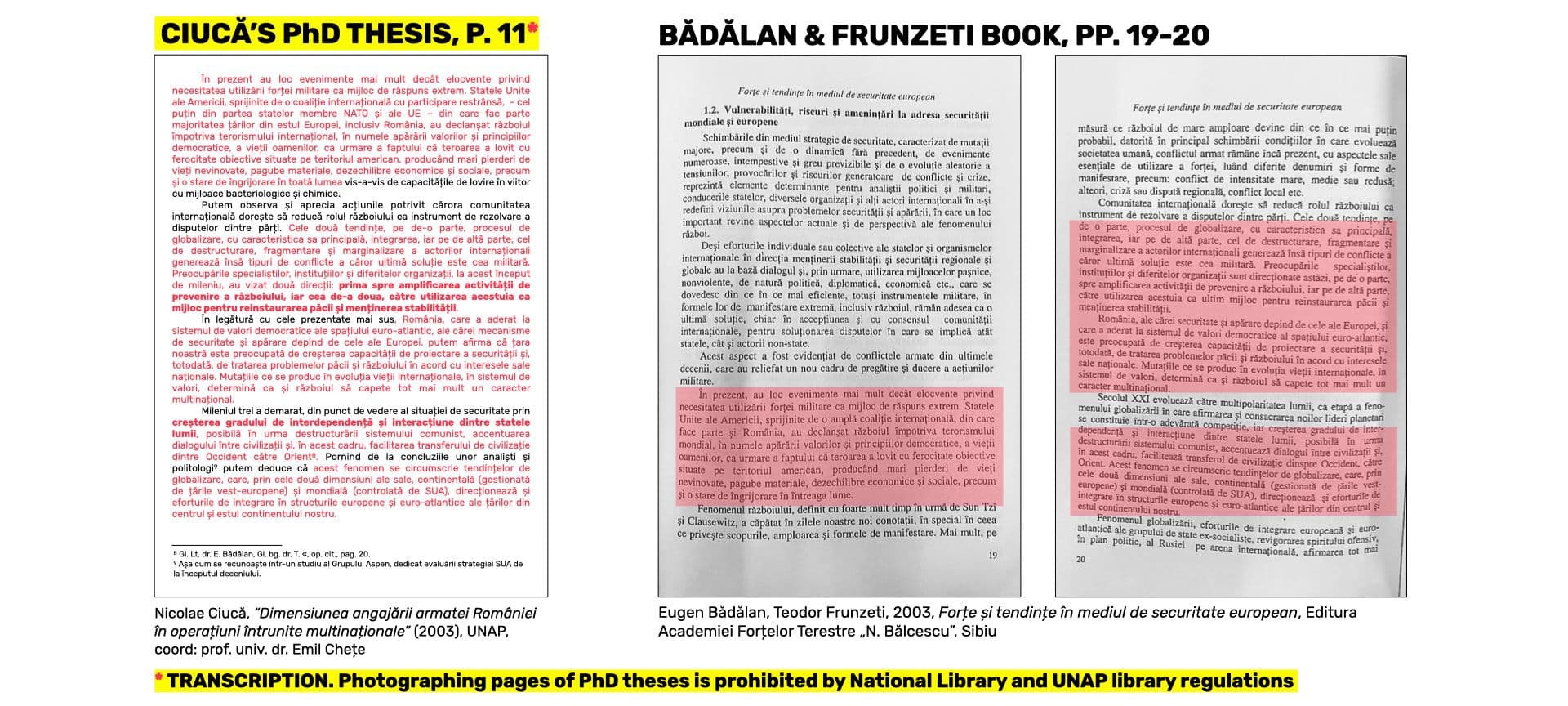
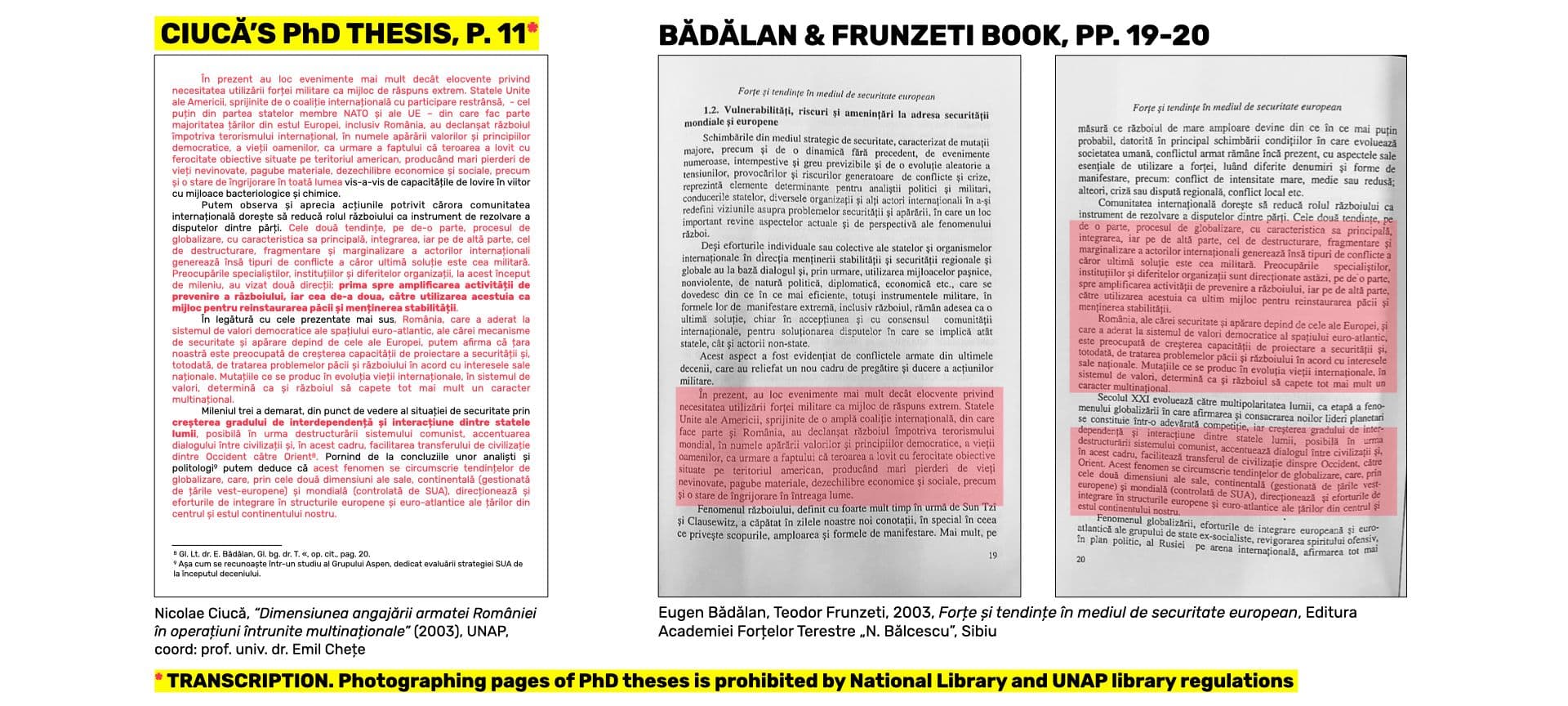
Prime minister Ciucă copied a grand total of 353 lines from the book authored by Bădălan and Frunzeti.
***
Another source of plagiarized content I discovered in this first chapter is the doctoral thesis of Paul Dănuț Duță, a former employee at a UNAP research center. The thesis, entitled Legitimate International Military Actions, was defended at UNAP in 2001.
The two doctoral theses, defended two years apart - by Ciucă and by Duță - have one thing in common: Professor Emil Chețe, who coordinated both of them.
I discovered plagiarized content from Duță's thesis on seven pages of prime minister Ciucă's doctoral thesis. The texts were copied to a tee, but without proper attribution and no quotation marks. Even the footnotes in Duță's work were copied.
The plagiarizing of footnotes indicates plagiarism without the shadow of a doubt.
For instance, footnotes 13 (on page 16), 14, 15, 16, 17, 18 (on page 17), and 19 (on page 18) were copied verbatim.
Duță's doctoral thesis is not mentioned in the bibliography at the end of Ciucă's thesis.


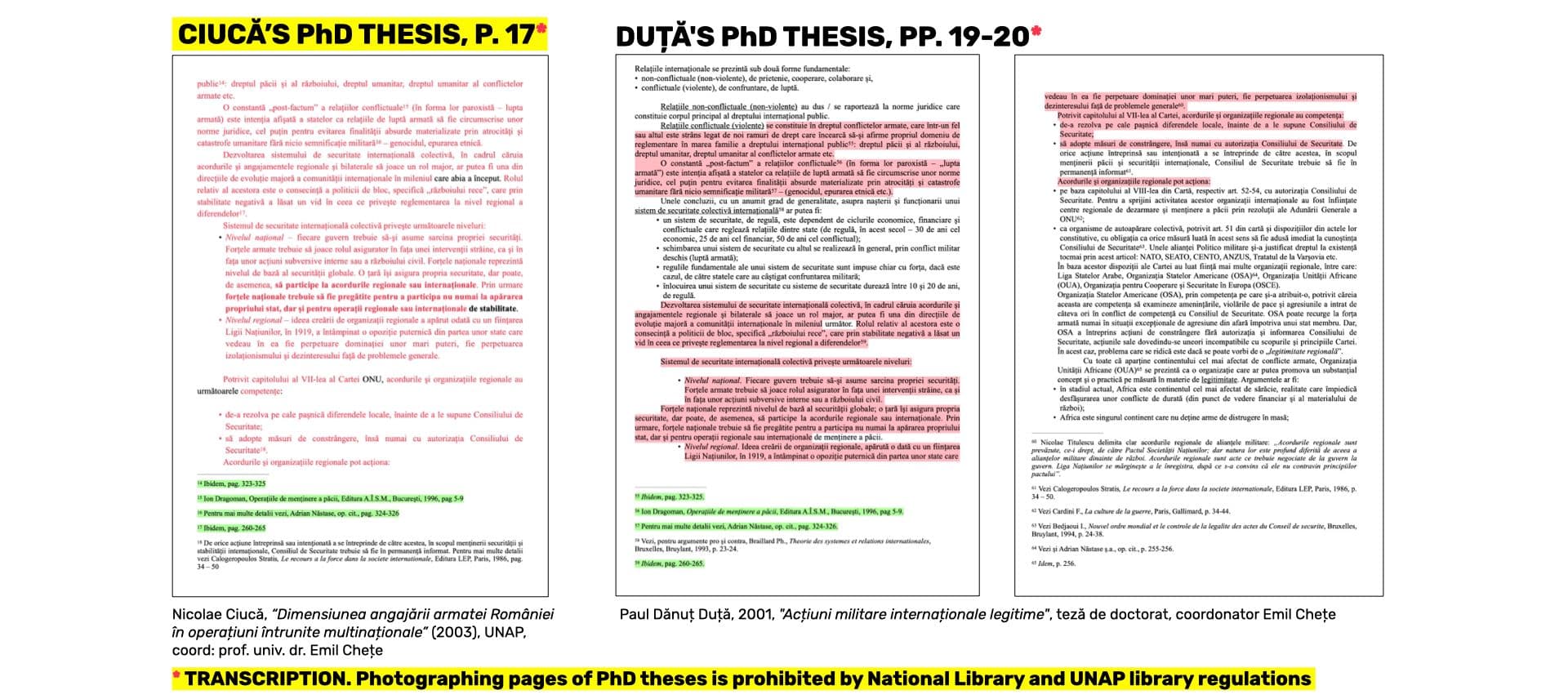
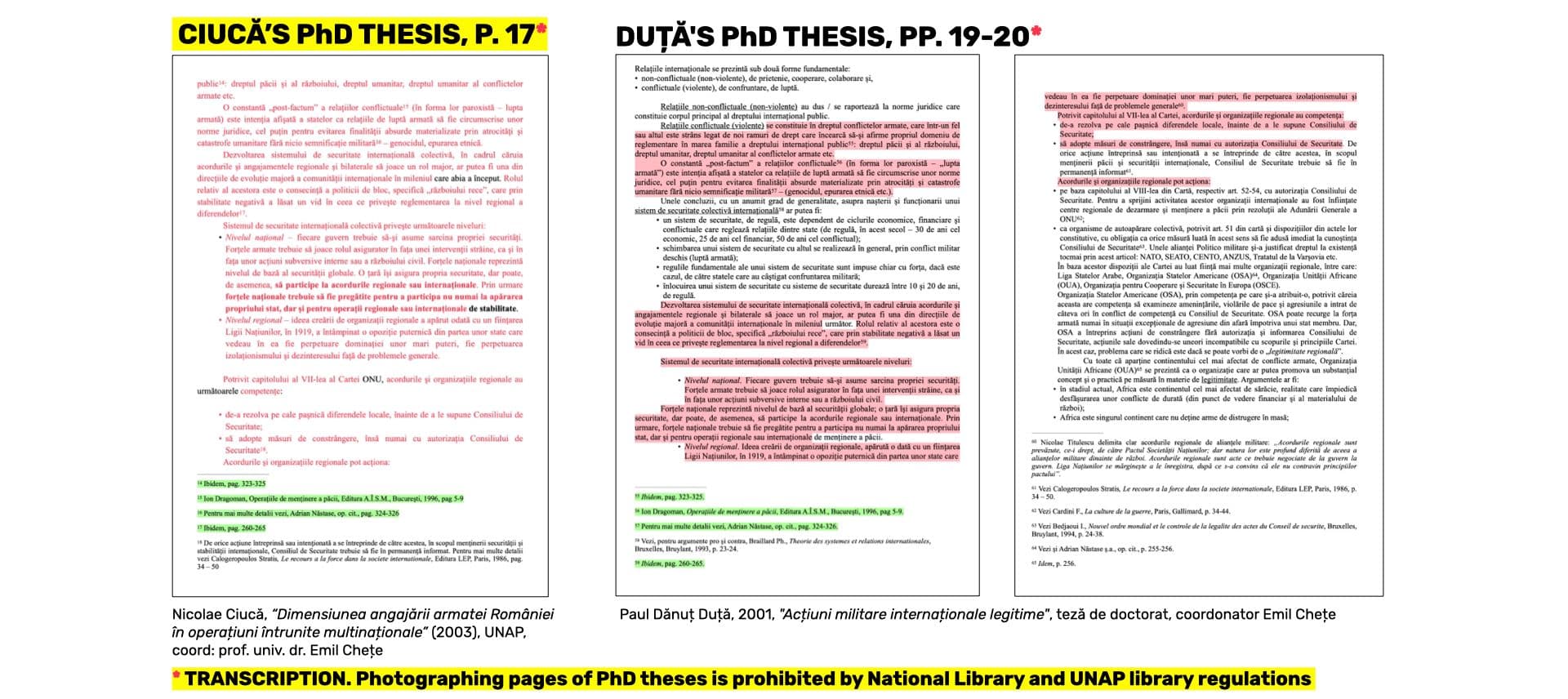
Chapters I and II contain plagiarized content from Mircea Mândru's doctoral thesis. Mândru was also a former UNAP employee in the past.
The paper titled The Content of the Main Strategic Actions Undertaken by the Romanian Army in Multinational Operations Other than War was defended in 1999 at UNAP, under the coordination of Valentin Arsenie. Mândru later published his work under the title The World Between the Cold War and the Hot Peace at the Expert Publishing House in Bucharest.
In several footnotes, Ciucă cites Mândru's book, but the page number in the source-text is incorrectly indicated.
295 lines in Ciucă's thesis, copied over nine pages, were taken from Mândru's thesis.
The prime minister's thesis even includes some formatting elements taken from Mândru's work. Specifically, words or phrases that appear in bold in Mândru's thesis are also bolded in Ciucă's thesis. Two examples, from page 38 of Ciucă's thesis: "new strategic concept," "Collective Security through Cooperation."
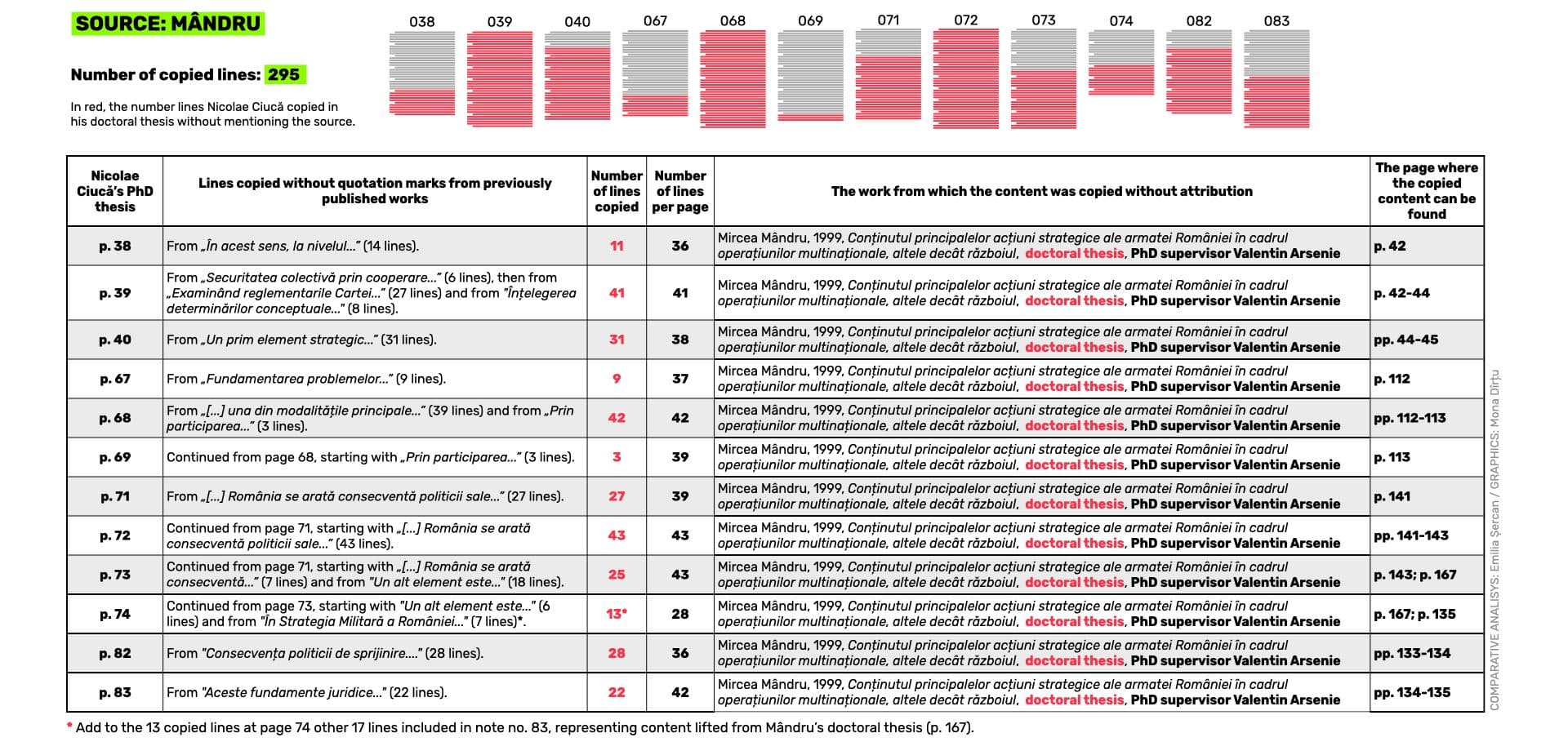
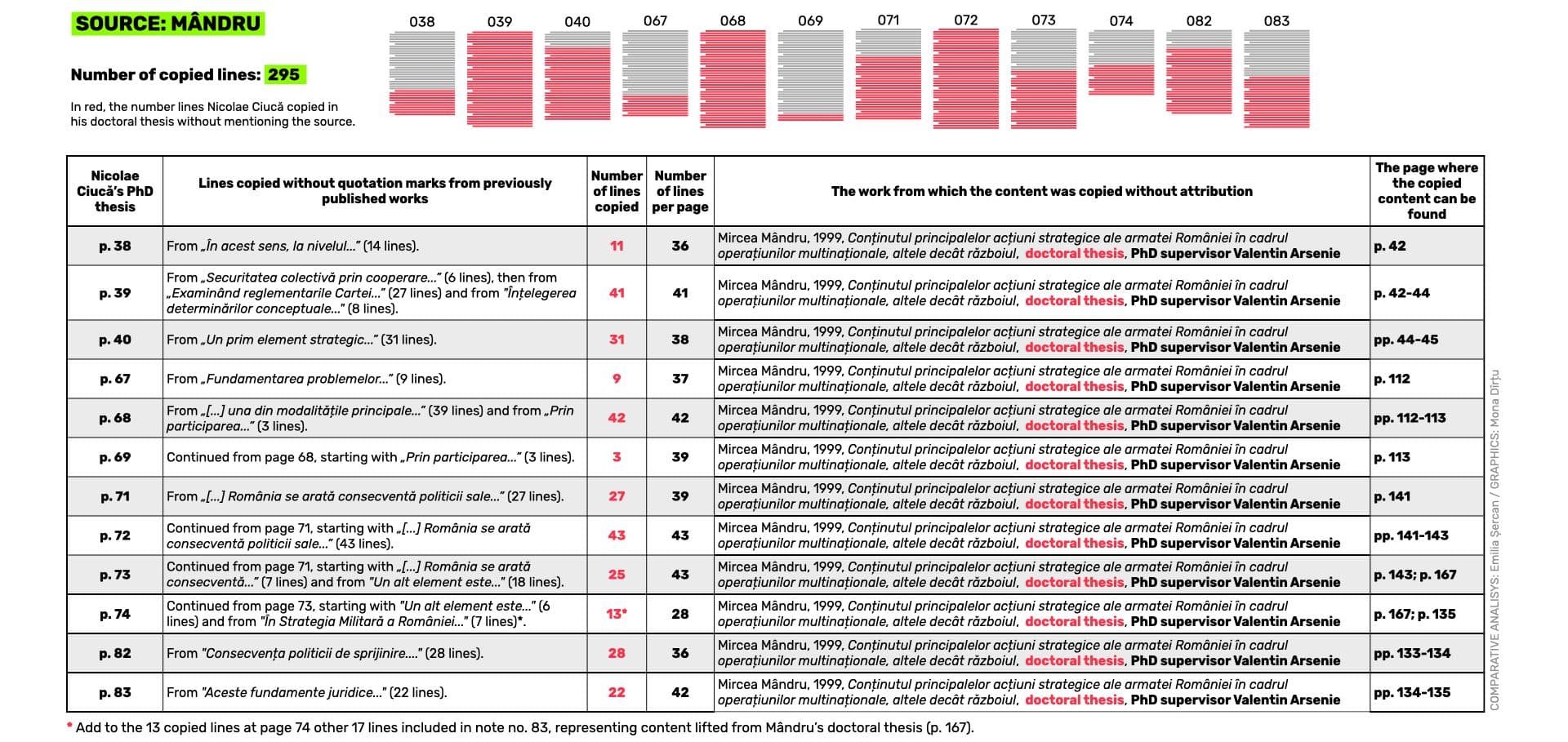
One example of a page copied wholesale is number 68. At the beginning of the page, Ciucă added the words "We think that." The rest of the page is plagiarized - with some insignificant changes.
In the two examples below, I compare page 68 of Ciucă's thesis with both versions of Mândru's work: his 1999 thesis and its published version from 2000.
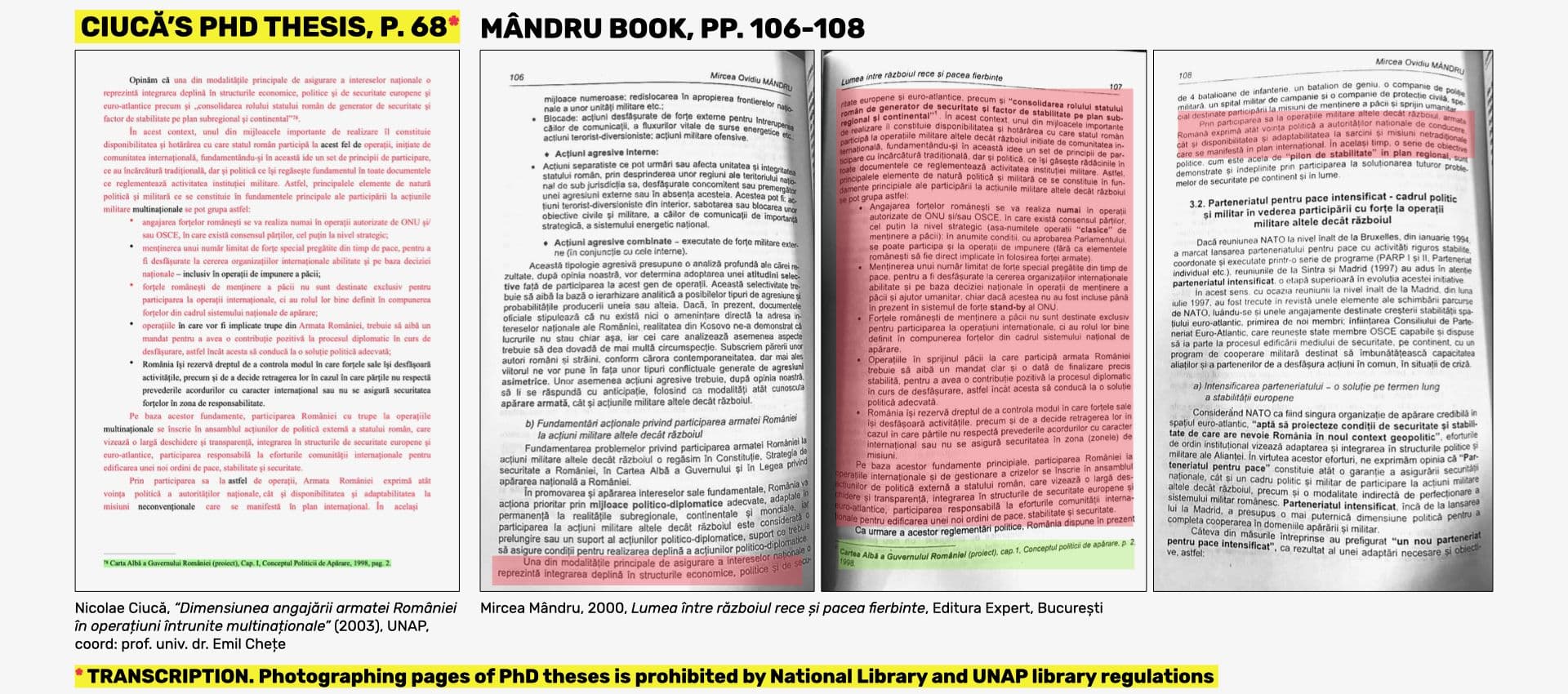
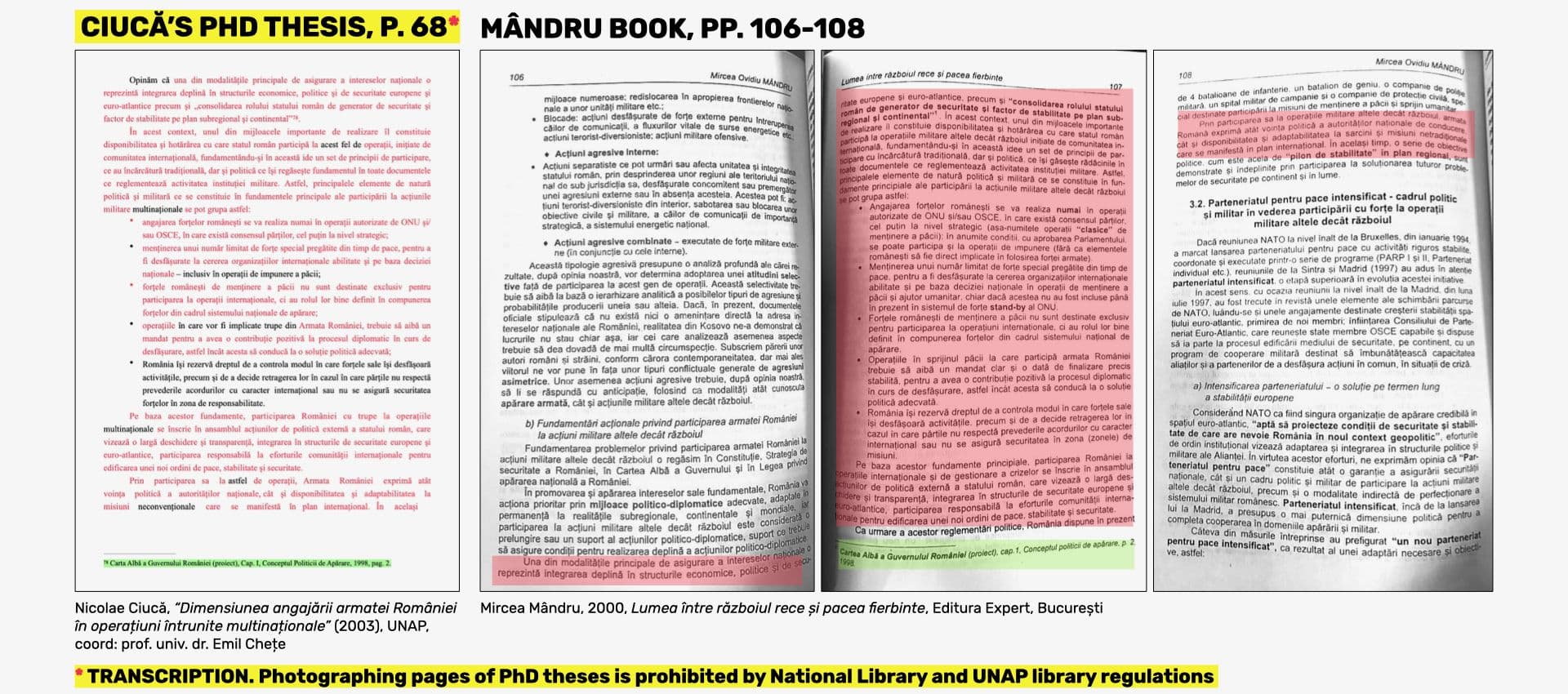
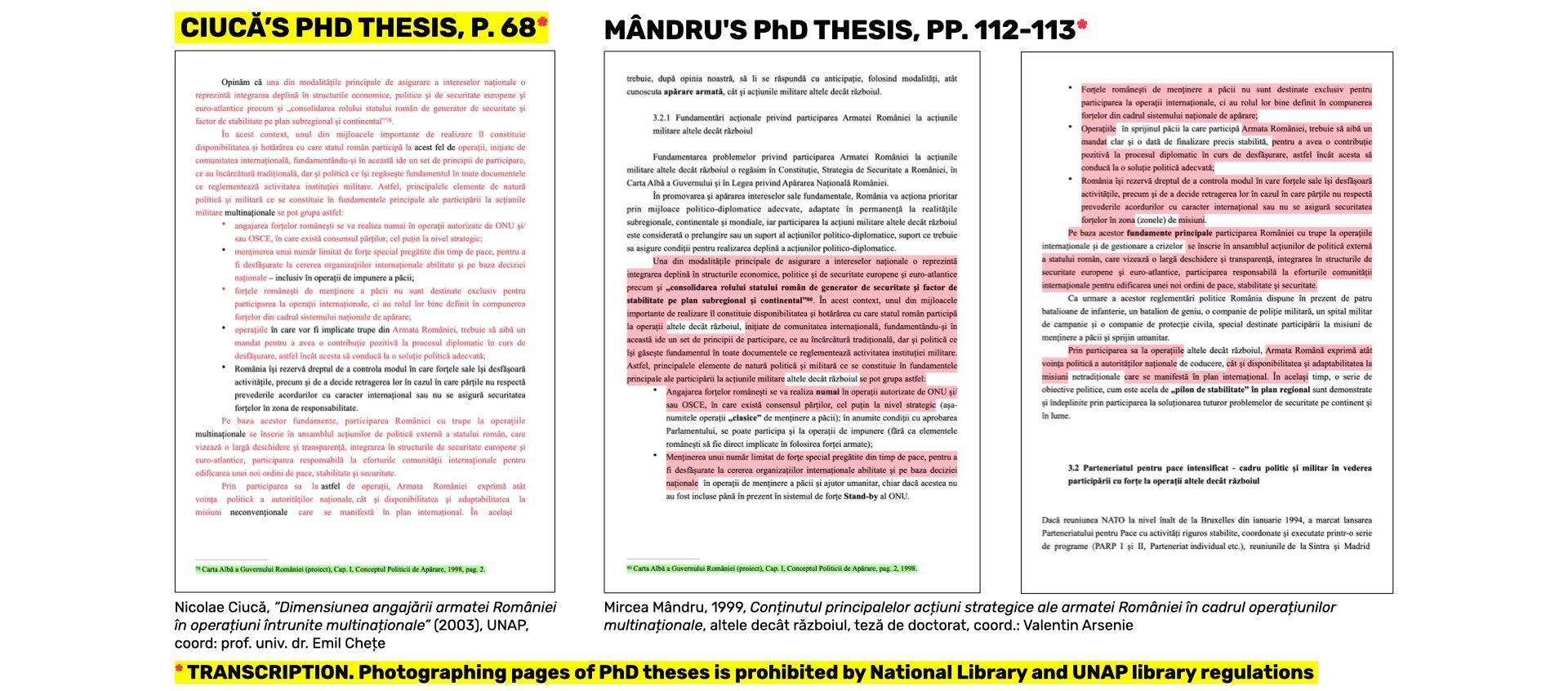
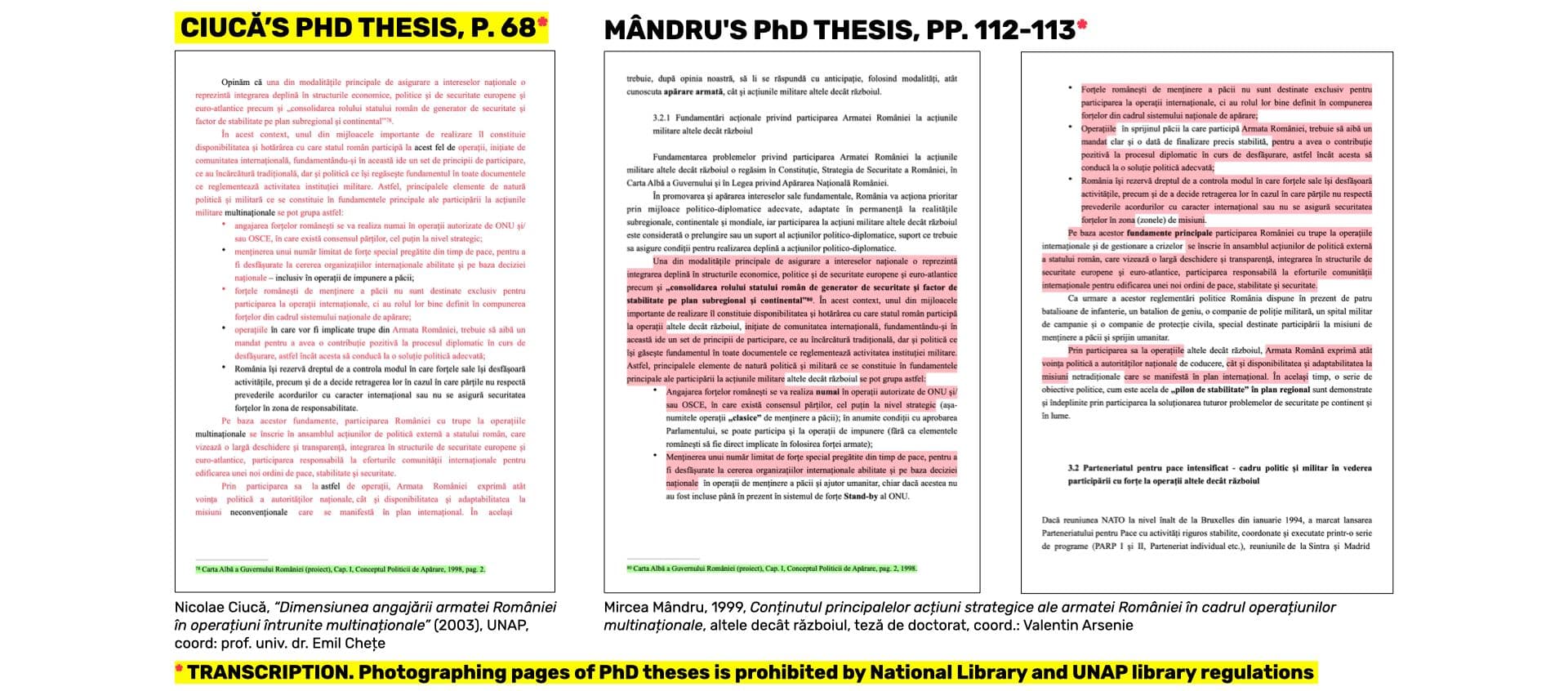
A special situation occurs on page 74 of the thesis, where Ciucă takes a seven-line paragraph from page 135 in Mândru's thesis, at the end of which he adds an explanatory footnote no shorter than 17 lines of text, written in a font size of 10. The contents of this footnote are also lifted from Mândru's thesis, where the text runs at 21 lines.
***
Pages 94 through 97 include content taken without citation from another work, published in 2000 by Mircea Mândru along with three other authors.
In just four pages, totaling 160 lines, Ciucă copies 76 lines without attribution.


II. PLAGIARISM CONCEALING TECHNIQUES
In the 42 pages of the thesis in which I discovered plagiarized content, I identified several ways of masking the segments lifted without citation.
Technique no. 1: Jumbled syntax
The syntax of a paragraph can be easily rearranged and give the impression of original wording, although the content is practically the same.
Two examples:




Technique no. 2: Rephrasing the beginning of a paragraph
Through this trick, the plagiarized text is "buried" in a seemingly "clean" sentence. It usually involves adding words or slight rewordings at the beginning or end of the sentence - by using synonyms or equivalent phrasing, among other means.
In the example below, "The 21st century is evolving towards…" from Bădălan & Frunzeti's book becomes "The third millennium has taken off…", in Ciucă's thesis. This rewording is followed by a sequence of 31 identical words.




Technique no. 3: Eliminating non-essential words
In the example below, the deletion of phrases such as "of the state", "strategically led" or "the outbreak of war on terrorism" - in a paragraph that refers to terrorist attacks and the international community's response to terrorism - masks obvious plagiarism.


In the example below, the only things taken out by the PhD candidate from a seven-line paragraph were the conjunction „and” and a punctuation mark.


Also, in many situations, Ciucă uses synonymous words or turns of phrase, in order to achieve the impression of original content.
Technique no. 4: Formating ideas as checklists
Another trick to mask plagiarism is to change the formatting: an enumeration in a compact paragraph taken from the source paper can easily become a list in which the enumerated ideas appear in distinct lines, each of them preceded by a dash.
The first sentence on page 12 of the thesis, copied from Bădălan & Frunzeti, changes the order of the enumeration and arranges the ideas, written by the two authors as a compact sentence, into a checklist.


III. OTHER INDICATIONS OF PLAGIARISM
Footnotes
In several cases, the footnotes are also an indication of plagiarism.
Footnote number 40, from page 29 of the thesis, makes reference to the book The Third and Last World War, by John Adams, published by Antet, in Bucharest, 1998.
In fact, the author's name is James Adams, not John, and the book was published by Antet Publishing House in 1998 under a different title: The Next World War: Computers Are the Weapons and the Front Line Is Everywhere.
The wrong author and book title are copied from Mircea Mândru's doctoral thesis and they are also reprised on page 145 of Mândru's book The World between the Cold War and the Hot Peace, published by the Expert Publishing House in Bucharest.
Footnote number 51, located on page 40 of the thesis, is also plagiarized from Mândru's PhD, where it’s numbered as 32. This footnote references Paul Cerjan, with the work Peacekeeping and Collective Security, NDU Press.
Footnote number 49, on page 38 of the thesis, refers to a quote attributed to Mândru, which appears on pages 57 through 63, in the book The World Between the Cold War and the Hot Peace.
In this case, in the footnote Ciucă indicated a quote, correctly marked with quotation marks. The problem is that the quote does not belong to Mândru, but to Boutros Boutros Ghali. Mândru correctly cites the former Secretary-General of the United Nations, with quotation marks and attribution.
This footnote very clearly proves plagiarism. Had the following formulation been used, the content marked with quotation marks would have been correctly cited: Boutros Boutros Ghali, 1992, p. 3, apud Mircea Mândru, 1999, The Content of the Main Strategic Actions Undertaken by the Romanian Army in Multinational Operations Other than War, doctoral thesis, UNAP.
Other footnotes are copied from Bădălan and Frunzeti's book--for example, footnotes 41 and 42, which can be found on page 185 of their book.
Bibliography
Aside from the plagiarized content itself, or the error-ridden footnotes, the bibliography of Nicolae Ciucă's thesis also has some serious problems.
The bibliography, which is five pages long, is not alphabetically arranged, as stipulated not only by academic writing standards, but also by the rules of all publishing houses worldwide, be they large or small. Also, in the bibliography, Ciucă mentions works without specifying the year of their publication, the publishing house and its location, as academic norms mandate.
Several works cited in the footnotes are not included in the Bibliography, which is a major red flag.
For instance, there is no mention in Ciucă’s Bibliography of the doctoral theses written by Paul Dănuț Duță and Mircea Mândru. It only includes the print version of Mândru's work, while Duță's book isn’t even mentioned as such.
Here are some other examples of works indicated by Ciucă in the footnotes, but not listed in the bibliography, identified in just the first 30 pages of the thesis - I did not check the rest of the content after page 30. All these works are lifted from footnotes plagiarized from other authors.
- Footnote no. 18 cites Calogeropoulos Stratis, Le recours a la force dans la société internationale, Editura LEP, Paris, 1986, pp. 34–50.
- Footnote no. 19 cites F. Cardini, La culture de la guerre, Gllimard, Paris, 1992, pp. 34-44. The correct name of the publishing house is Gallimard.
- Footnote no. 24 cites M. Jopp, Les relations étrangères de l’Europe occidentale: implication de la crise Yugoslave, Cahiers de Chaillot, 1994, pp. 43-67.
- Footnote no. 25 cites S. Woodward, The Balkan Tragedy: Chaos and Dissolution after the Cold War, The Brooking Institutions, Washington, 1995, pp. 8–24.
- Footnote no. 26 cites Butros Butros Ghali, Point de vue, l’ONU et les opérations de maintien de la paix, a la croisée de chemin, în Relations Internationales et Stratégique, Automne, 1993, p. 1.
In other situations, the Bibliography mentions works that are not cited at all in the thesis. One of the authors mentioned in the Bibliography without being referenced in the paper is the prime minister's doctoral supervisor himself, Emil Chețe.
Some examples of works in Romanian (titles translated), which were included in the bibliography without being cited:
- Emil Chețe, Confrontation. Research-Masking, Publishing House of the Academy of Higher Military Studies, Bucharest, 1999.
- Emil Chețe, Strategic Masking, Publishing House of the Academy of Higher Military Studies, Bucharest, 2001.
- Ionel Cloșcă, On International Differences and the Ways to Solve Them, Scientific Publishing House, Bucharest, 1973.
- Ionel Cloșcă, The Peaceful Regulation of Disputes Between States, The Political Publishing House, Bucharest, 1980.
- Ionel Cloșcă, The War of the Entire Nation and Contemporary International Law, The Military Publishing House, Bucharest, 1986.
Appendices
prime minister Nicolae Ciucă’s doctoral thesis has 162 pages of appendices - more than the actual paper. Many of these appendices have no direct connection with the content of the thesis. The only purpose for which they were included was probably to double the paper’s volume and create the impression of academic consistency.
- Appendix no. 1: Partnership objectives: current stage and planning - 3 pages
- Appendix no. 2: Participation in NATO-led PK operations - 1 page
- Appendix no. 3: Planned financial resources as a potential NATO member - 1 page
- Appendix no. 4: Gross domestic product and price index - 1 page
- Appendix no. 5: Budget allotment and expenses for defense - 1 page
- Appendix no. 6: Annual average for (active) military personnel - 1 page
- Appendix no. 7: The gradual supply of military forces for potential collective defense missions - 1 page
- Appendix no. 8: Military force supplies for multinational cooperation initiatives - 1 page
- Appendix no. 9: The gradual supply of military forces for PfP operations - 1 page
- Appendix no. 10: The structural organization and evolution of the structure of ground forces - 1 page
- Appendix no. 11: The situation and evolution of required ground force personnel - 1 page
- Appendix no. 12: Staffing level in the Air Force - 1 page
- Appendix no. 13: The structure of the naval forces - 1 page
- Appendix no. 14: Standard operating procedures of the… infantry battalion - 148 pages
Appendix no. 4, for instance, consists of a short table showing the evolution of the price index and its annual change, of the GDP in current and constant prices, and of its annual changes between 1995 and 2004 (author’s note: an estimate for 2004, as the thesis was defended in 2003). Not only was the relevance of these data not explained in the context of Romanian Army Engagement in Multinational Joint Operations, but the data were not referenced at all in the thesis’ content.
Another example is Appendix no. 5, which presents Romania’s defense expenditures and budget allotment between 2000 and 2003. The data in this appendix is not used as a basis for research in the thesis either.
But the most bizarre one is Appendix no. 14, which counts no less than 148 pages and describes the standard operating procedures of an infantry battalion in Craiova. The name of the battalion has been redacted from the cover of the document and replaced with an ellipsis.
Appendix no. 14 looks like a leaflet containing the procedures for organizing an infantry battalion. The document is divided into chapters and has a table of contents. Its content, which refers to the military decision-making process, mission analysis, mission planning, information management, combat exercises, etc., is presented as relevant in a scientific paper on the way in which the Romanian army engages "in multinational joint operations."
Perhaps this annex would have been relevant, had the doctoral student critically or comparatively analyzed parts of this document with a similar one describing the activities of another battalion; or perhaps compared it to a leaflet pertaining to the same battalion, but from a different period in time--for instance, before Romania had been invited to join NATO.
The prime minister's statement
In a statement issued on January 17, through the Press Office of the Romanian Government, at my request for a comment, prime minister Nicolae Ciucă claims that his thesis is "the result of the scientific research [undertaken during his] doctoral school years" and that "it reflects the work put in."
"I appreciate your interest in academic ethics and it being observed in scientific work.
I assure you that throughout my entire career serving as an officer of the Romanian Army I have taken on all the responsibilities, regardless of the position I held. I will not relinquish this principle in my career as a politician. My doctoral thesis is the result of the scientific research I undertook during my doctoral school years and it reflects the work put in.
The paper has been (and continues to be) available to the public for almost 20 years and was drafted in accordance with the legal requirements in effect at that time," the Romanian prime minister stated.
Plagiarist prime ministers
Nicolae Ciucă is the second prime minister accused of plagiarism during his term. The first one was Victor Ponta, who served as a social-democrat prime minister between May 2012 and November 2015.
On June 18, 2012, the British science journal Nature published an exclusive report, which accused the then Romanian prime minister, Victor Ponta, of having plagiarized his doctoral thesis.
Ponta denied the plagiarism, and, in order to get rid of the accusation, used the power of his office in order to mutilate enforced anti-plagiarism rules and regulations, as well as to change the line-up of the committees that should have checked his thesis. He did all this at the risk of compromising the international reputation of the Romanian academic milieu.
The regulations of the National Council for the Attestation of University Degrees, Diplomas, and Certificates (CNATDCU) were changed on the very day when its members were assembled in a meeting to analyze his thesis. This way, the verdict of plagiarism they adopted did not produce legal effects.
CNATDCU's prerogatives to check complaints of plagiarism were abruptly transferred to another institution, CNECSDTI - The National Council for Ethics in Scientific Research, Technological Development, and Innovation -, which found that Victor Ponta's thesis met the "academic requirements" of the year it was defended, i.e., 2003, and decided to uphold the prime minister’s doctoral title.
The following day, the Ethics Commission of the University of Bucharest issued a plagiarism decision for Victor Ponta's thesis, yet Ponta maintained his academic title until 2016.
Only in 2016 did he receive a plagiarism verdict from CNATDCU and had his doctorate revoked, following his resignation as a result of the Club Colectiv tragedy and after CNATDCU had regained its prerogatives for analyzing plagiarism complaints.
***
Another prime minister who faced a plagiarism charge was Mihai Tudose. In his case, the plagiarism accusation emerged before his appointment as head of government.
Mihai Tudose was accused of plagiarizing his doctoral thesis in August 2015, but this did not stop President Klaus Iohannis from nominating him as prime minister in June 2017.
Tudose's thesis was never analyzed by CNATDCU, although the institution did register a plagiarism complaint against him.
Instead, Mihai Tudose implicitly admitted his plagiarism through a court request to denounce his doctorate, which he filed in March 2016.
In 2018, he sued the Ministry of Education and asked the court to revoke his doctorate.
The plagiarists’ so-called arguments
Cases of plagiarism committed by public figures, especially doctoral theses defended before 2011, when the new education law was adopted, were often justified through absurd, false, or made-up arguments that exculpated academic theft.
Most of the excuses the plagiarists or their defenders conjured had to do with the fact that the old legislation did not regulate the doctoral field and also invoked the rules for academic writing at the time the theses were defended.
The first notorious plagiarist to invoke the lack of regulations, setting the tone for this narrative for an entire decade, was former prime minister Victor Ponta, who plagiarized a doctoral dissertation defended in 2003, just like current prime minister Nicolae Ciucă.
This is completely false.
According to the legislation in effect at the time when both current prime minister Ciucă and former prime minister Ponta enrolled in doctoral studies, it was mandatory that the doctoral thesis be original.
Article 22 of Government Decision no. 37/1999 on the organization and process of doctoral studies, in effect in 2003, stipulates that "the doctoral thesis must contain elements of originality specific to the field, as well as ways in which they can be scientifically validated."
The condition of originality was also provided by article 28, paragraph (2), which referred to publicly defending the doctoral thesis, and which stated that "the debate should focus on the elements of originality of the doctoral thesis and on recognizing the value of the results obtained."
Beyond the condition of originality, it is also mandatory for a doctoral thesis to be a scientific research paper.
Prime minister Nicolae Ciucă’s doctoral thesis, The Scope of Romanian Army Engagement in Multinational Joint Operations, is neither original nor does it have a scientific research component, attested by certain results, which would garner the work the „recognition of its value.”
The Romanian version of this article was published on January 18th, 2022.
Translated by Ioana Pelehatăi

Avem nevoie de ajutorul tău!
Mulți ne citesc, puțini ne susțin. Asta e realitatea. Dar jurnalismul independent și de serviciu public nu se face cu aer, nici cu încurajări, și mai ales nici cu bani de la partide, politicieni sau industriile care creează dependență. Se face, în primul rând, cu bani de la cititori, adică de cei care sunt informați corect, cu mari eforturi, de puținii jurnaliști corecți care au mai rămas în România.
De aceea, este vital pentru noi să fim susținuți de cititorii noștri.
Dacă ne susții cu o sumă mică pe lună sau prin redirecționarea a 3.5% din impozitul tău pe venit, noi vom putea să-ți oferim în continuare jurnalism independent, onest, care merge în profunzime, să ne continuăm lupta contra corupției, plagiatelor, dezinformării, poluării, să facem reportaje imersive despre România reală și să scriem despre oamenii care o transformă în bine. Să dăm zgomotul la o parte și să-ți arătăm ce merită cu adevărat știut din ce se întâmplă în jur.
Ne poți ajuta chiar acum. Orice sumă contează, dar faptul că devii și rămâi abonat PressOne face toată diferența. Poți folosi direct caseta de mai jos sau accesa pagina Susține pentru alte modalități în care ne poți sprijini.
Vrei să ne ajuți? Orice sumă contează.
Share this

